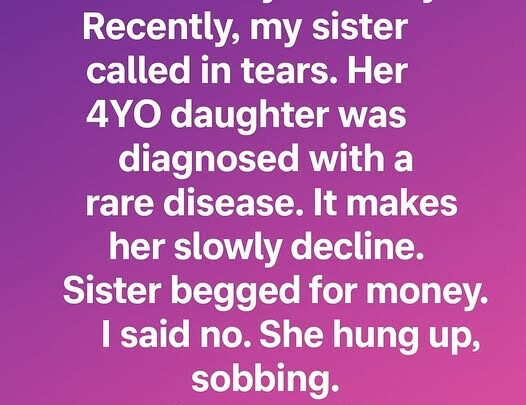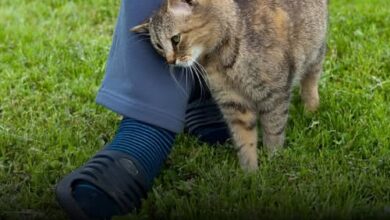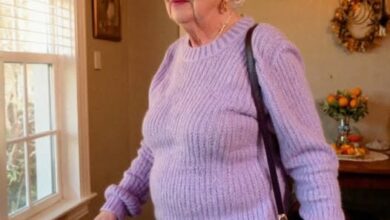Story
I didn’t help my sister when she needed it the most, and then I found out the truth.

I’ve always had one strict rule: never lend or give money to family. It wasn’t born from greed but from experience. Over the years, I’d seen money twist relationships, create resentment, and turn love into obligation. So I built a wall — firm, clear, and safe. No money for family, no exceptions.
But rules have a strange way of being tested when love is involved.
One afternoon, my sister called me in tears. Her voice trembled as she told me that her four-year-old daughter had been diagnosed with a rare illness. It wasn’t immediately fatal, but it would slowly take away her strength. My sister said she needed help — financial help — to afford treatments and travel costs.
I froze. My rule flashed in my mind, louder than her words. I told her softly but firmly, no. I thought I was protecting both of us from future tension. She went quiet, thanked me anyway, and we said a sad goodbye.
The next morning, I got messages from mutual friends. “Hey, have you seen your sister’s post?” one wrote. I clicked the link, and my stomach dropped. She had created a public fundraiser — with her daughter’s photo, medical documents, and a heartfelt message. It wasn’t manipulative or dramatic. It was honest. Real. And reading it, I felt something heavy in my chest that wasn’t guilt — it was shame.
She hadn’t blamed me, hadn’t even mentioned me, yet everyone who knew us could tell I wasn’t helping. The comments were full of kindness and support from strangers, while I — her own sibling — had shut the door on her when she needed me most.
That evening, I drove to her house. When she opened the door, she looked exhausted. Her eyes were swollen from crying, but she still smiled weakly. My niece was sitting on the couch, coloring flowers with crayons, blissfully unaware of the storm around her.
“I came to talk,” I said. My voice cracked a little. “And to say I’m sorry.”
My sister sat down, and for a long moment, neither of us spoke. Then I said the words I’d been avoiding. “When you called, I heard your words, but I didn’t listen. I was too busy protecting a rule that didn’t need protecting.”
Tears welled up in her eyes again. “I didn’t want to break your rule,” she whispered. “I just… didn’t know what else to do. I’d do anything for her.”
That was when I realized — my rule wasn’t strength. It was fear. A shield I used to avoid getting hurt, to stay detached. But love, real love, isn’t safe or comfortable. It asks you to step outside the rules when someone you care about needs you most.
So I broke my rule. Not just by offering her money, but by promising something bigger — to show up. I told her I’d go with her to the hospital meetings, help organize appointments, and run errands so she could rest. For the first time in years, we sat together at the kitchen table, talking, crying, even laughing a little.
She hugged me tightly before I left. “Thank you,” she said. “Not for the money — for coming back.”
Driving home that night, I thought about how easily principles can turn into walls. My rule had kept me “safe,” but it had also kept me distant. Now, I see things differently. Rules can guide you, but they shouldn’t silence compassion.
Since then, I’ve learned that family isn’t about financial help or strict boundaries — it’s about showing up in ways that matter most. My sister and I still face hard days, but we face them together. And every time I see my niece smile, I know I made the right choice.
Sometimes life tests us quietly — not through big choices, but through moments that reveal what kind of person we really want to be. This time, I chose kindness over rules, love over pride. And I’ll never regret it.
Disclaimer: All stories published on this website are for entertainment and storytelling purposes only. They do not have an identified author and are not claimed to be based on real events or people. Any resemblance to actual persons or events is purely coincidental.



